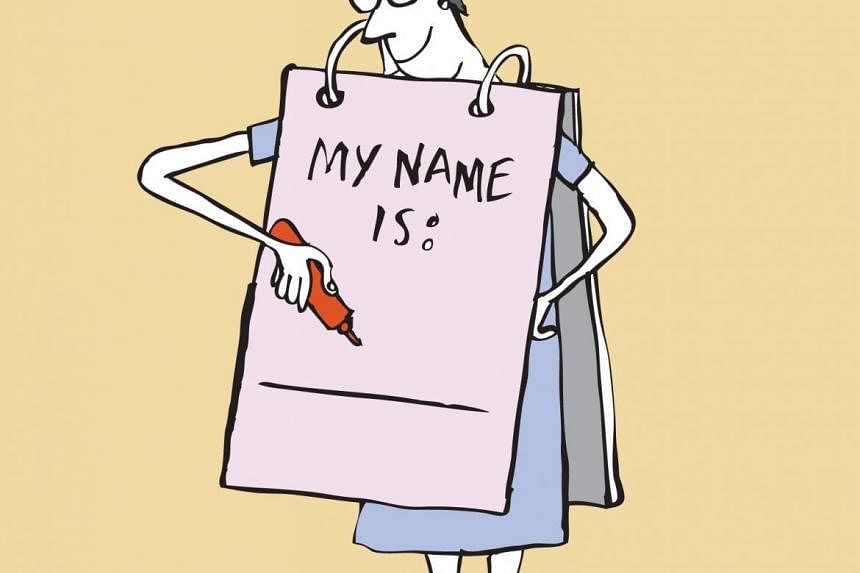I used to envy my brother for his given name of Yi Long.
This was given to him by my mother and she said she chose it because she wanted him to be artistic (yi) and dragons (long) are considered outstanding in Chinese culture.
When I came along two years later, my father named me Ai Li - as this was easy to pronounce.
As I would tell people who ask me in Chinese for my name: "My name is Ai Li. Aiqing de ai. Meili de li." (Ai, as in love. Li, as in beautiful)
It was easy - too easy - to write. I learnt to write the characters by Primary 2.
But I didn't fancy a simple name. I wanted what I thought were refined names.
I wanted to be a "Hanyan" - literally "harbouring smoke" - the ethereal and mysterious heroine in Taiwanese romance author Chiung Yao's Deep Within The Courtyard.
I thought about my name, after a recent article by my colleague Larry Teo in the bilingual newspaper MyPaper, about trends in Chinese names and how one's name betrays one's generation.
He wrote about how the characters han, xuan and yu, associated with refinement or the universe, have been popping up with greater frequency in the names of Chinese Singaporean children.
Given that a large number of Chinese Singaporeans are Christians, the Chinese word for gratitude, en, has also gained currency. Look no further than actress Rui En.
In contrast, one does not often see people below age 20 with names that have characters such as hua or lian (flower and lotus).
My late grandmother was Ah Chun and her name harks back to faraway China and spring, and an era when Chinese names were translated in an Orientalist way as Golden Phoenix or Lotus Flower.
Names can be generation markers, it's true. Just like newborns now aren't likely to bear Western names such as Ronnie, Lovey or Ivan.
I think mine too is a name whose time has passed. I have come across only three other Ai Li's, with the same characters. I am 35. Two are older, one a year younger.
When schools started using hanyu pinyin instead of dialect anglicisations of Chinese names in the 1980s, I went from Ho Ai Li to He Aili. Cheeky classmates tried to change my gender by calling me "He Ali".
I was happy to have my jolly-sounding Hokkien surname back when the policy was eased in the 1990s.
This also meant that years later, a boss would call me what sounded like "Holy" in front of amused colleagues.
I count myself lucky that I am not Cantonese, or my name might be anglicised as Ho Oi Lai. On top of "Ho, ho, ho" salutations at Christmas, I will have to brace myself for Oi, oi, oi's.
Still, I didn't like my name.
I hated it when a teacher made fun of me by calling me Ai Mei Li - a vainpot's name. Ai Li also sounds like the Chinese translation of English names such as Alice or Alicia.
It was only when I moved to Taipei some years ago that I saw Ai Li in a new light.
In Taiwan, as in Hong Kong, Chinese is written using the traditional script.
In this script, the character Ai is written with the word for heart (xin) in it, and the character Li has the word for deer (lu). When fleshed out in complex Chinese script, my name is a thing of beauty.
And as Hokkien speakers have pointed out, my full name actually sounds like "love you very much" in my native dialect.
It is almost as if I can feel my parents' love for me every time my name is called. Aww.
I have since grown to really like my name. Not only is it aesthetically pleasing when written in traditional Chinese script, it is lovely in Westernised form too.
It's all of six letters long - painless when it comes to filling up forms of any kind.
It looks pretty in roman letters - slim, elegant lines balanced by the round "o" and the strong arch of "A".
And the name rolls off the tongue quite easily, meaning colleagues and contacts do not have to call me by my initials, surname or a contraction of my name. (Don't call me Ai, okay?)
Perhaps my father, in his pragmatic way, did know a thing about naming after all.
These days, hardly anyone calls my brother by his arty name as he had given himself an English one instead.
As for me, I have learnt to stop envying and love my name.


